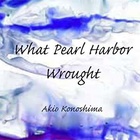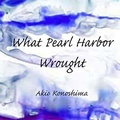The hon-ke (family home) stood on a rise at the start of a small vale. In the twilight, Jo could make out rice paddies; flat rows of vines, probably yams; hedgelike rows of tea plants; and low fruit trees on the side. Close up, the house seemed much larger than it had when he and Isamu saw it from the river ferry. The thatched roof was about two feet thick. In spots where the mortar had chipped off of the outside wall, Jo could see bricks made of clay dirt and straw. Attached to the house was a lean-to shed, where, Isamu said, they kept two sheep.
Isamu’s wife Hiroko—another cousin—smiled broadly as she came out of the house, followed by her two children, a boy about four and a girl a year or so older. A circular cotton cap, typically worn by Japanese housewives, offset her round, smiling face as she bowed. Then, turning to her young son, said, “Hiroshi, kare ga—he’s the American soldier.”
The boy stepped forward, bowed quickly, then moved behind his mother, hiding his face in her apron. As the daughter stepped forward and bowed, Hiroko laughed. Her son had been asking all week who or what a “Beigun no heitai—an American Army soldier” was. Seeing Jo probably left him more confused than ever, she said, since Jo looked the same as any Japanese.
Once inside the house, Jo and Isamu sat on opposite sides of a quilt-covered hibachi in a sunken square hollow in the center of the main room. The room itself seemed large since its only other furniture was a floor screen partitioning the room. Hiroko, after getting some tea, went to the kitchen to prepare supper. Through the passageway Jo could see two pots and a cast iron kettle hung over an open fire. The children went to a side room to play.
“Uncle will be so glad to see you,” Isamu said as they sat. “It’s been such a long wait for him.” He said that the old man was taking a nap so he would feel fresh when Jo arrived but would be up soon.
“Those who knew your father worried about your family when the war started,” Isamu said. “But Uncle worried the most. As the family patriarch, he felt responsible for your family’s well-being.”
He said that early in the war when the newspapers in Japan reported that the U.S. government was rounding up the Japanese in America and putting them into concentration camps, Uncle became especially concerned.
“Uncle even sent a letter through the Red Cross...never got a response, so worried more,” Isamu said.
Later, when the B-29s came flying over, there were other things to worry about, Isamu said, though even then, Uncle often expressed his concern about Jo’s family. Uncle’s concern over Jo’s family eased somewhat only when the war was over and letters and care packages from Jo’s father began to arrive.
“Shikashi, kuro shitta... still, your family must have suffered hardship; no?” Isamu asked.
“Maa...well, not that much,” Jo said, surprised. It was the first time anyone in Japan had asked him about the wartime evacuation of Japanese Americans from the U.S. West Coast, that anyone in Japan had expressed any concern to him over what had happened to those of Japanese ancestry in America during the war.
Jo’s feelings at the time of the evacuation were muted. He was in his late teens and had never been out of California. His parents were about to lose everything—home, livelihood, and even dreams of the future for their children. But for Jo it was different. He felt no mental anguish. The very laws which barred Jo and his parents from the rights and protection of U.S. citizenship insulated Jo from the sense of betrayal felt by Nisei who were citizens. He was, after all, technically a Japanese subject and with the war, he expected even fewer rights than before.
As he recalled the evacuation—the hot sun at the race track in Santa Anita, the smell of the horse stables they were housed in, the soot in the turn-of-the century passenger cars of the train that took the internees to the camp in Wyoming—Jo looked back at his cousin and wondered what to say.
Tell him about the physical hardship? On their farm in California Jo, even while in grade school, had worked on cold spring or autumn mornings before changing clothes and rushing off to get to class in time. He had dug irrigation ditches, thinned long rows of lettuce, chopped wood, often stayed up all night in the summer time to irrigate parched fields. Physically, being in the camps was no hardship. Besides, he could not by any stretch of his imagination compare his own experiences during the evacuation with the sufferings of so many millions in the war-torn areas of the world.
But for Jo the hurt was far more than physical. He was now part of the Allied Occupation and its highly publicized goal to nurture democracy in Japan. How was he to explain to his Japanese cousin that he, Jo, a U.S. soldier whose only home was in America, could not become a U.S. citizen? Jo wondered what his cousin might see. Shame? Humiliation? That he, Jo,despite America’s talk of ideals, was living a lie?
“Uncle is old and often forgets things,” Isamu said, changing the subject with Jo’s silence. “Because of all the anxiety caused by the war, unless Uncle can see things for himself, he won’t always believe what he’s been told. Often he is very depressed. Your visit will certainly help lift his spirits, ease some of the pain.”
“If so, I’m glad,” Jo said, though unsure of what Isamu meant by easing Uncle’s “pain.”
From the start, Isamu had been referring to the head of the household as Oji-san—Uncle—instead of using the Japanese word “Oto-san” or the more familiar “Chi-chi” for father. “I’m really his nephew,” Isamu explained. “My real father is the next oldest son in the family.”
He was about to say more, when a rustling sound came through the shoji from an adjacent room.
“Ara. Seems like Uncle’s awake,” Isamu said, “Chotto gomen…” and got up, saying he would help the old man dress. Oji-san, he said, was so anxious to see Jo he would not want to waste even a minute.
© 2010 Akio Konoshima




